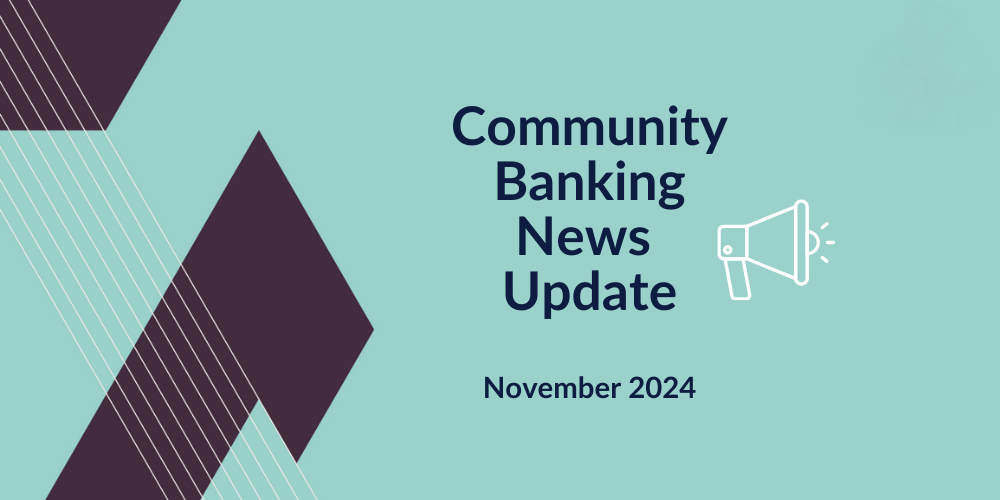This month's major stories in community banking and their impact
A rate cut from the Fed, a major correspondent banking partnership, the CFPB’s open banking rule, Grasshopper Bank’s merger with Auto Club Trust, TD Bank’s AML failures, and an Oklahoma bank closing — how do these news items impact community financial institutions?
Welcome to the latest edition of Community Banking News Update, your monthly roundup of the top news that affects community banks and credit unions and why they matter. Read last month’s issue here.
1. Federal Reserve Locks in Quarter-Point Rate Cut Amid Post-Election Economic Uncertainty
The Federal Reserve announced a quarter-point cut to its benchmark interest rate on Thursday, marking the second consecutive rate reduction this year. The Federal Open Market Committee (FOMC) voted unanimously to lower the federal funds rate target range to 4.5%-4.75%, citing rising unemployment and steady progress in reducing inflation. This anticipated move is intended to support continued economic expansion while keeping inflation near the Fed’s target. However, given the recent election outcome and potential inflationary pressures from new tariffs under President-elect Trump, the Fed’s future rate cuts remain uncertain.
Why this matters to community banks and credit unions
Interest rate changes directly impact community banks and credit unions by influencing lending rates, mortgage costs, and consumer credit. Lower rates can boost loan demand, but political uncertainties and potential inflationary pressures from higher tariffs could make rate forecasts more unpredictable. This added complexity may require financial institutions to remain flexible in planning until the new administration's economic policies become clearer.
2. BNY Mellon and Mizuho Bank Partner on Correspondent Banking to Streamline Global Trade Services
BNY Mellon and Mizuho Bank have announced a unique partnership to enhance international trade services through a shared correspondent banking network. This collaboration will help their respective corporate clients access a broader trade network while simplifying the challenges of increasingly complex know-your-customer (KYC) and global regulatory compliance requirements.
Through this non-compete agreement, clients of both banks can access an integrated network of Relationship Management Applications (RMAs), eliminating the need to establish individual RMAs. This setup expands their trade partner options without the cost and effort of building independent connections, simplifying compliance and opening new cross-border opportunities.
Why this matters to community banks and credit unions
While community banks may not have the resources for large-scale partnerships, they can still leverage strategic correspondent banking relationships to tap into international payment profits. Partnerships with multiple correspondent banks add redundancy, helping mitigate the costs of "de-risking," the growing phenomenon of correspondents cutting ties with banks, impacting cross-border transactions. By embracing new technology and collaborating with correspondent banks, community banks can automate international wire transfer processes to cut down on errors and fraud, enhancing their ability to serve clients in global markets and earn non-interest income through FX fees.
Read our article on leveraging multiple correspondent banking relationships through a single platform: https://acceleronbank.com/articles/correspondent-banking-de-risk
3. CFPB’s Final Rule on Open Banking Sparks Industry Lawsuit as Debate on Competition Heats Up
The Consumer Financial Protection Bureau (CFPB) has issued its final rule on open banking, requiring financial institutions to share customer data with third-party providers at the consumer’s request. The 1033 rule aims to boost competition by enabling customers to move financial data, such as spending histories, to new institutions. It also extends beyond data linked to credit cards, mobile wallets, and bank accounts to include data from payment apps as well. In response, the Bank Policy Institute and other banking groups have filed a lawsuit, arguing that the rule poses risks to consumer privacy.
Director Rohit Chopra defended the rule, emphasizing its benefits for consumer choice and competition among financial providers. He emphasized the legal requirement for the CFPB to ensure consumer data rights, adding that the agency will continue upholding statutory mandates on data sharing despite industry opposition.
Why this matters to community banks and credit unions
While small banks and credit unions with assets below $850 million are exempt from this rule, community banks may see increased competition from fintechs and other third-party providers who can now leverage granular data to attract customers who expect seamless connectivity with other financial apps. Staying aligned with open banking trends may still be crucial for maintaining relevance, as consumer expectations evolve towards flexible, integrated banking experiences that bridge traditional and digital financial ecosystems.
4. Grasshopper Bank to Acquire Auto Club Trust, Expanding Reach to 13 Million AAA Members
Grasshopper Bank, a New York-based digital lender, has announced plans to acquire Auto Club Trust (ACT), a federally chartered savings bank based in Dearborn, Michigan, and a subsidiary of The Auto Club Group (ACG). The acquisition, expected to close in the first half of 2025 pending regulatory approval, would increase Grasshopper's total assets to around $1.4 billion. The deal designates Grasshopper as the exclusive provider of specific depository and lending services for ACG’s 13 million AAA members. As part of this transaction, Grasshopper will raise $35 million in new equity, and ACG will receive a 4.9% ownership stake in Grasshopper, worth approximately $7 million, totaling $42 million in new capital.
The merger aligns with Grasshopper’s strategy to expand its offerings in consumer banking while maintaining its focus on business and innovation. Under this arrangement, the AAA brand will serve as the customer-facing interface, with Grasshopper handling the infrastructure. CEO Mike Butler explained that this model advances Grasshopper's strategy in white-label banking and Banking as a Service (BaaS), specifically for a large, consumer-oriented brand rather than a tech company. Grasshopper’s API-enabled embedded finance platform will allow AAA to offer FDIC-insured deposit accounts and payment services, with Grasshopper managing the operational backend.
Why this matters to community banks and credit unions
For community banks, this acquisition highlights the growing trend of digital banks expanding into consumer product spaces through strategic partnerships with brands. Grasshopper’s model demonstrates how smaller banks can increase reach without extensive physical infrastructure by leveraging BaaS and embedded finance. Community banks might consider similar partnerships within their communities or industry niches, allowing them to scale services digitally and tap into established customer networks without compromising on localized service or compliance.
Read our interview with FedFis President Tanner Mayo as he discusses how community financial institutions can approach the embedded finance opportunity: https://acceleronbank.com/articles/community-banking-champions-tanner-mayo
5. TD Bank Faces $3 Billion in Fines and U.S. Asset Cap Over AML Failures
TD Bank has been hit with a $3.09 billion penalty and an asset cap on its U.S. retail operations following an extensive investigation into its anti-money laundering (AML) practices. The Justice Department, Financial Crimes Enforcement Network (FinCEN), and Federal Reserve imposed fines and corrective measures after discovering systemic breakdowns that allowed hundreds of millions in illicit transactions, including drug-related funds. The OCC issued a $434 billion asset cap on TD’s U.S. retail division, with requirements for TD to overhaul its AML program, establish a dedicated compliance office in the U.S., and undergo independent monitoring over four years.
The penalties also restrict TD's ability to pay dividends until it proves adequate resourcing and attention to AML compliance. The investigation revealed that TD’s lack of internal controls and prioritization of growth over compliance left it vulnerable to illegal activity. The OCC, DOJ, and FinCEN cited a failure to monitor $18.3 trillion in customer transactions adequately, missed suspicious activity reports (SARs), and outdated systems that neglected crucial data, such as funnel accounts and domestic ACH transactions.
Why this matters to community banks and credit unions
Community banks can take valuable lessons from TD’s case, highlighting the importance of investing in skilled AML staff, ensuring internal monitoring capabilities, and aligning growth incentives with compliance priorities. The enforcement also stresses that AML oversight should be woven into all levels of governance, from board members to line managers, emphasizing that compliance gaps can have severe financial and operational consequences. For smaller banks, this serves as a reminder that meeting AML requirements with robust, well-supported controls is critical to avoiding costly penalties and maintaining safe operations.
Read our Co-Founder and Chief AML Officer Sarah Beth Felix’s commentary on what community banks can learn from this penalty in Bank Director.
6. Oklahoma’s First National Bank of Lindsay Shut Down Amid Fraud Allegations; FDIC Takes Over Insured Deposits
The Office of the Comptroller of the Currency (OCC) closed First National Bank of Lindsay in Oklahoma on Friday, citing "false and deceptive bank records" and signs of capital depletion due to suspected fraud. The OCC also found that the bank was in an unsafe condition to transact business and that its assets were less than its obligations to creditors and others, the agency said in a press release.
First Bank & Trust Co. of Duncan, Oklahoma, has assumed the failed bank's insured deposits. The OCC has referred the matter to the Department of Justice for further investigation and potential accountability measures. This marks the second bank failure of 2024.
Why this matters to community banks and credit unions
The closure of First National Bank of Lindsay is a reminder of the critical importance of sound governance and transparent operations, particularly as community banks navigate heightened regulatory scrutiny. This failure underscores the risks associated with inadequate controls, which can severely impact capital and customer trust. For other community banks, maintaining rigorous compliance and internal audit practices is essential to avoid reputational damage and potential regulatory actions.
Please note: this blog post is intended for general informational and educational purposes only and does not provide financial services advice. It should not be considered a substitute for professional guidance.
Acceleron builds patented software that allows community banks and credit unions to conduct international payment transactions profitably through a correspondent banking marketplace. Serving over 200 financial institutions and facilitating more than $1 billion in international payments annually, Acceleron helps small banks generate non-interest income and compete more effectively with high-fee big banks. Our solutions integrate seamlessly with top payments platforms, ensuring quick implementation and smooth operation.
Subscribe to our monthly newsletter to stay ahead of the curve and get content you won't find anywhere else!
 Daisy Lin, Head of Marketing, Acceleron
Daisy Lin, Head of Marketing, Acceleron





